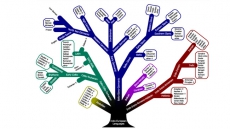Researchers have discovered a dramatic decline in genetic diversity in male lineages four to eight thousand years ago -- likely the result of the accumulation of material wealth.
This male-specific decline occurred during the mid- to late-Neolithic period while, in contrast, female genetic diversity was on the rise.
"Instead of 'survival of the fittest' in biological sense, the accumulation of wealth and power may have increased the reproductive success of a limited number of 'socially fit' males and their sons," said lead study author Melissa Wilson Sayres from Arizona State University.
The study was published online in the journal Genome Research.
It is widely recognised among scientists that a major bottleneck, or decrease in genetic diversity, occurred approximately 50 thousand years ago when a subset of humans left Africa and migrated across the rest of the world.
Signatures of this bottleneck appear in most genes of non-African populations, whether they are inherited from both parents or, as confirmed in this study, only along the father's or mother's genetic lines.
"Most surprisingly to us, we detected another, male-specific, bottleneck during a period of global growth," said senior author Toomas Kivisild from University of Cambridge.
"The signal for this bottleneck dates to a time period four to eight thousand years ago, when humans in different parts of the world had become sedentary farmers," Kivisild said.
Researchers studied DNA samples taken from the saliva or blood of 456 males living in seven regions of five continents including Africa, the Andes, South-Asia, near East and Central Asia, Europe and Oceania.
Scientists specifically studied the Y chromosome, which is passed down through the male lineage, and the mitochondria, which is passed to offspring by the genetic mother.
After using computer and statistical modelling, they found the two extreme "bottlenecks" in human genetic history, specifically the second found only in the male lineage.
Having a high level of genetic diversity is beneficial to humans for several reasons.
First, when the genes of individuals in a population vary greatly, the group has a greater chance of thriving and surviving - particularly against disease.
It may also reduce the likelihood of passing along unfavourable genetic traits, which can weaken a species over time.
According to Monika Karmin, a leading author of the study from University of Tartu, Estonia, their findings may have implications related to human health.
"We know that some populations are predisposed to certain types of genetic disorders," said Karmin.
"If we want to understand human health on a global scale, we need to know our global genetic history; that is what we are studying here," said Wilson Sayres.





